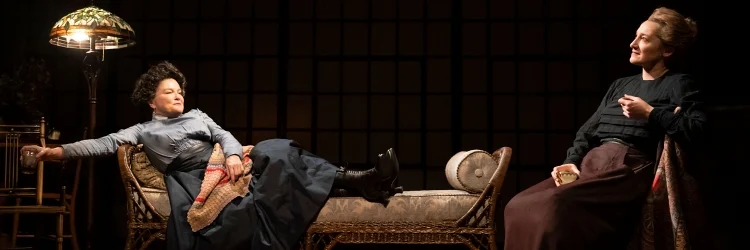Review of Audible Theater's The Half-Life of Marie Curie at the Minetta Lane Theatre
"The Half- Life of Marie Curie" is a very clever title for Lauren Gunderson's new world premiere play, now being presented by Audible at the Minetta Lane Theatre, considering Curie discovered and named the elements radium and polonium, but it gives the wrong impression altogether. It should be the incredible life of Marie Curie. She was the first woman to win a Nobel prize, the first person to win two Nobel prizes, the only woman to win in two fields, and the only person to win in multiple science fields - physics and chemistry - all before women were allowed to vote in France.
What is remarkable about Gunderson's The Half-Life of Marie Curie is that it manages to convey not only her astonishing achievements without sounding like a book report, but it captures her personal life as a female scientist of the times in a particularly elegant manner. There are only two characters, Marie Curie (Francesca Faridany) and Hertha Ayrton (Kate Mulgrew), a British engineer, mathematician, physicist, inventor and passionate suffragette. The structure of the play is fluid. It moves between a memory piece that breaks the fourth wall with monologues directed at the audience and scenes in the present with dialog between the two characters. But it all works seamlessly, and the writing is so resonant and insightful that I am tempted to quote every other line.
Gunderson presents both Curie and Ayrton with sympathy, understanding and a great deal of humor at some particularly tough moments. The Half-Life of Marie Curie begins with opening monologues by both Curie and Ayrton. Curie talks about radium and how it transforms itself over time into something "other than self" and equates it with a kind of abandonment. Which she relates to herself in her present state with her beloved husband and scientific partner, Pierre Curie, dead. Voilá, the melancholy and reflective Marie Curie who, when the play opens in 1911, is in the middle of a horrible social scandal that has her vilified in the press and on the streets.
Hertha, her brash and bold British colleague introduces herself to us by saying "There was a technical problem in the world and I fixed it and you're welcome." And she goes on to explain how she solved the problem of the hissing of the arc light that was in use at the time. She is on her way to Paris to stand by her fellow scientist Marie and stare down her enemies with her. She finds a howling crowd on Curie's doorstep that she threatens with bodily harm, and a thoroughly crushed and defeated friend inside. Through the process of whisking Marie and her children away from the toxic atmosphere of Paris to the tranquil English seaside of her country home, the two widows fight and heal and form a lifelong unshakeable bond.
The Half-Life of Marie Curie illustrates in a very organic, almost off-hand way how remarkable these two women were. What they were able to accomplish simply for the love of doing it, boggles the imagination. Equally impressive are the two actresses who play the roles of Curie and Ayrton. Faridany is luminous and vulnerable while maintaining an inviolate aura of passion and integrity for her work. Mulgrew is an absolute delight. She imbues Ayrton with a wry sense of humor and all the intelligence and compassion of a true leader of women. The two play extremely well together and it is impossible not to fall a little bit in love with them both.
The Half-Life of Marie Curie is not only a wonderful experience in the theater, it's an important work to be presented at this moment in time when we are trying to get more young women interested in science.
(Photo by Joan Marcus)
WHAT THE OTHER CRITICS SAID
"Unbeknownst to many New Yorkers, Gunderson has been the most produced contemporary playwright in the United States for two of the past three seasons, and she knows how to build actors' showcases that are sturdy, if not necessarily challenging for the audience. So this production — commissioned by the audiobook company Audible and directed by Gaye Taylor Upchurch — is at its best when it lets the two stars strut their stuff."
Elisabeth Vincentelli for New York Times
"While The Half-Life of Marie Curie may not be as inventive as the women it celebrates, it's enlightening and entertaining. Under Gaye Taylor Upchurch's unfussy direction, Faridany fleshes out the passive-depressive Curie with revealing flashes of intense passion for science and sex. Impressively, she holds her own opposite supernova Mulgrew, who is playing the lesser-known figure but has all the best lines. (Mulgrew's expressive voice will certainly be a highlight of the recording of the play that Audible plans to release.) Their performances do a lot to bring Gunderson's history lesson to life. These two women have chemistry."
Raven Snook for Time Out New York
"Despite Curie's name in the title, Kate Mulgrew's butch Ayrton is the major attraction... Gunderson lavishes all her best retorts and epigrams on Ayrton, and Mulgrew knows just what to do with them."
Robert Hofler for The Wrap
Originally published on
